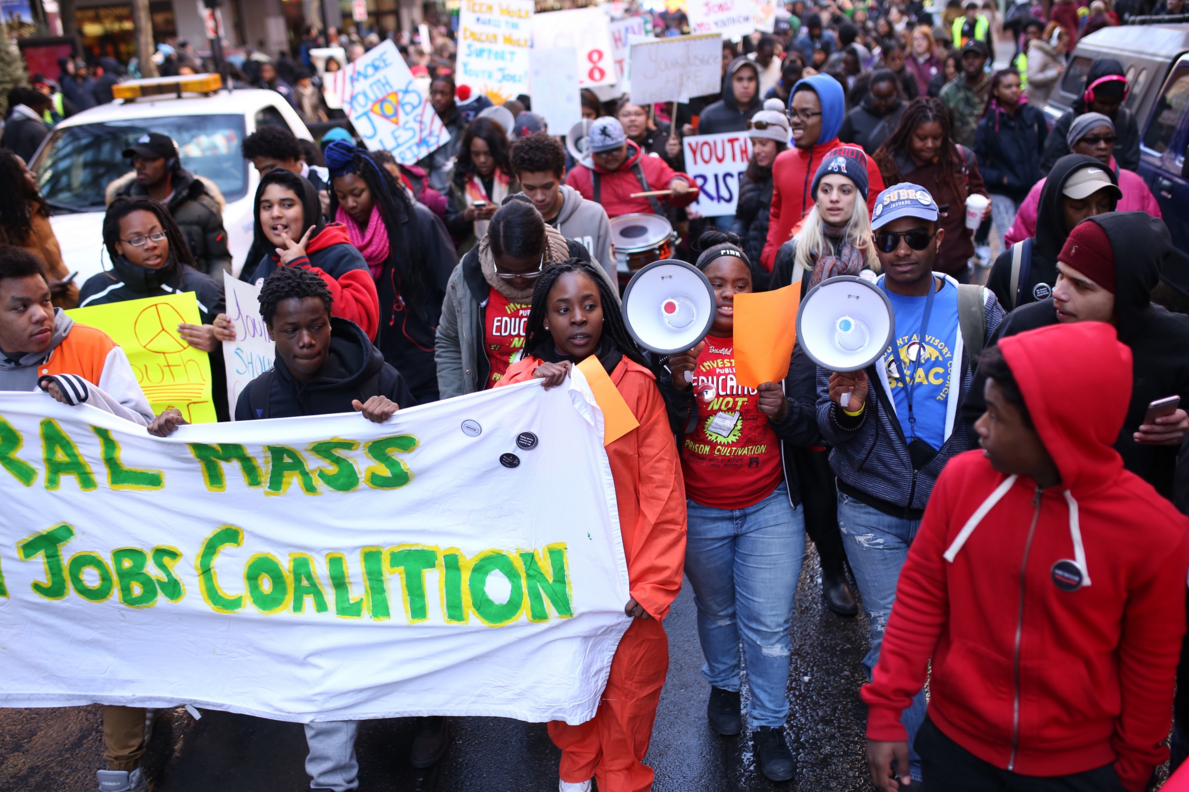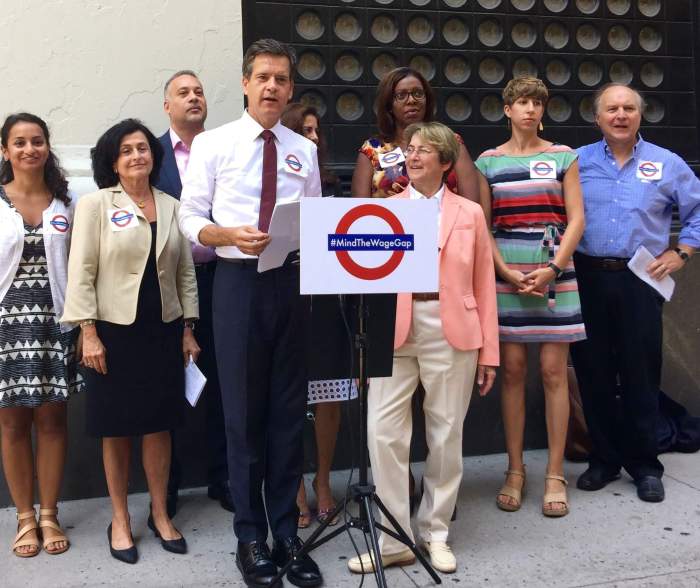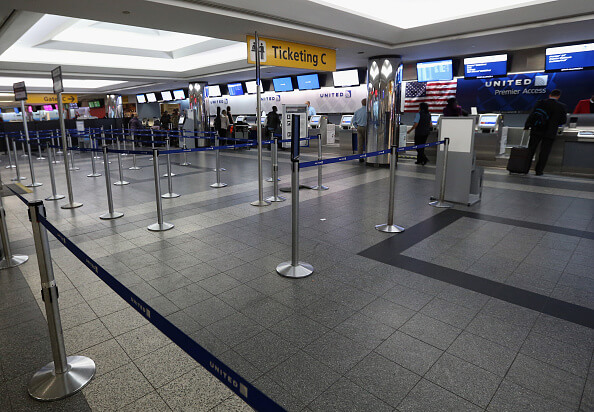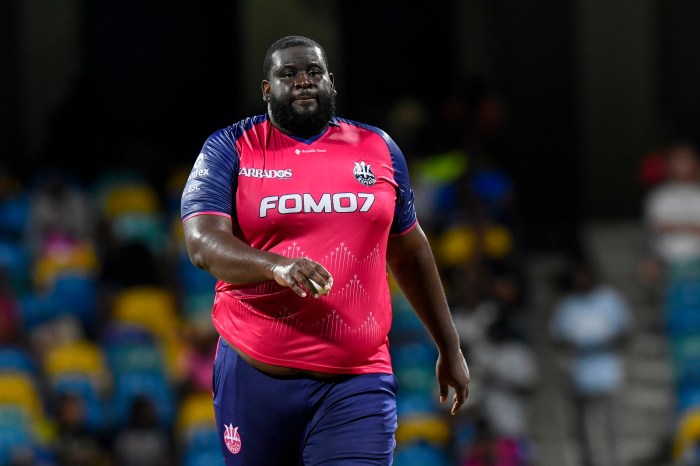Several hundred teenagers from around Massachusetts marched through Boston on Thursday morning, calling on the state for more funding for youth employment.
The conspicuously young crowd — mainly students on February break from school — stopped traffic as they marched their way through the Financial District, before heading to the State House to lobby legislators. The Youth Jobs Coalitionis seeking an increase in funding for YouthWorks, a state program that pays to place Massachusetts low-income teenagers in positions at nonprofits and government offices.
LIVE on #Periscope: Youth Jobs Coalition marching through Financial District #ihaveafuture https://t.co/PE2wbye1XX
— Spencer Buell (@MetroSpencer) February 18, 2016
They are asking legislators for $13 million for the program in next year’s budget, which they said would fund nearly 5,200 jobs. Funding in the latest state budget was $11.5 million.
RELATED:Six arrested at Logan Airport workers MLK Day protest State funding helps young people supplement their income at a time when finding a job is particularly hard for teens. While unemployment in the state has fallen to pre-recession levels, youth unemployment remains high, with as many as one in three teenagers working at least part-time. “Some of us need to support our families. Some of us need to support ourselves,” said Angele Errie, 17-year-old teen organizer for a Thursday rally, which began at the Cathedral Church of St. Paul. “I’m going to college this year. Unfortunately my parents can’t fully support my application fees, so I have to provide for myself as well as my parents providing for me.” The funding they’re asking for would only make a dent in the larger problem of youth unemployment, she said. The rally’s organizers said the state needs 90,000 jobs to fill the gap between available positions and young people looking for work. “This year we’re pushing for full youth employment,” said 18-year-old Ashley Delva, a lead organizer for the coalition. “Five thousand is not enough and we need to slowly increase so we can get to 90,000 jobs.”
POWEFUL. Boston keep going!!! #IHaveaFuture #JobsNotJails pic.twitter.com/as8AL0Wxmc
— Sectumsempra (@TheSwagChamp) February 18, 2016
RELATED:Tufts, Boston Medical Center workers to get $15 minimum wage The recession has hit young people especially hard, Lew Finfer, director and organizer for theMassachusetts Communities Action Network, said in an interview at the church. The downturn shrunk the number of available jobs, and shifted more adults into lower-paying jobs that were once filled by more teens, he said.
More than half of Massachusetts teenagers had jobs around 2000. In 2013, that figure was 28 percent, astudy from Northeastern’s Center for Labor Market Studies found. Protestors were also calling for an increase in funding for a career training program and for more private companies to contribute by hiring young people who are in or just graduated high school.
“The good news is there are something like 350 private sector companies [employing youth], but the bad news is that only represents 20 percent of companies that have 100-plus employees,” Finfer said. Only one in four of the youth who apply for the positions in state-funded jobs programs get them, Finfer said.
OKAY #ihaveafuture #jobsnotjails #youthjustice #inspirationnotincarceration pic.twitter.com/xVwq7VW46n
— Youth Voice Project (@BostonYVP) February 18, 2016
One of those selected for the program was 17-year-old Dominique Singletary, who is a student at the Woodward School for Girls in Quincy.
RELATED:US unemployment falls to 4.9 percent, lowest rate in 8 years Last year, she worked with Youth Force, a nonprofit leadership group, drawing a minimum wage salary and working close to full-time through the summer, she said.
It would have been difficult for her to find a job elsewhere, Singletary said.
Employers are “constantly looking for people of older age because they think they have more knowledge,” she said. “That’s why [we] do rallies — to prove that teens can help. They can make a difference. They can contribute.” At the pre-march rally, Eros Marqez, 16, volunteered to speak to the crowd of hundreds.
“We want jobs. We want money,” the Worcester teenager said, gripping a microphone. “We want the opportunity to do better in the future.”
Demonstrators and supporters tweeted using the hashtag #IHaveAFuture, which by early afternoon was a trending topic on Twitter.
Eros Marqez, 16, of Worcester: “We want jobs!” #IhaveaFuture pic.twitter.com/eX5tmPZzAE
— Spencer Buell (@MetroSpencer) February 18, 2016
Eros Marqez, 16, of Worcester: “We want jobs!” #IhaveaFuture pic.twitter.com/eX5tmPZzAE
— Spencer Buell (@MetroSpencer) February 18, 2016






















